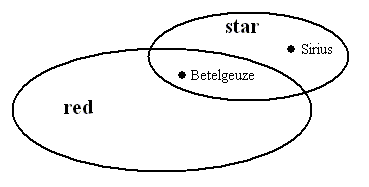
That is to say, in " the sun is red " (here meaning what we say while looking at the sunset) the significatum of 'red' is an auxiliary being (red is not ontologically independent) and thus an accidental predicament, while as such it is not yet determined whether it here is a proprium (the predicable 'proprium') or an accidens (the predicable 'accidens'). This is only established when we know the predicative context of 'red'. So in "hemoglobine is red" the term 'red' is a proprium.
' Red ' can as such never be a predicable (there are only 4 or 5 predicables, as we saw in the previous Section). But it can certainly represent a predicable ( ' Red ' can be the predicable 'accidens', or it can be, as we saw, the predicable 'proprium' ). A predicable is a type of term (depending on the predicative context), and 'red' is not a type of term (it is just a term), but can belong to one or another type of term.
' Red ' can figure in a praedicare in quale, that is, either in a predication of a difference, or in a predication of a proprium or in a predication of an accidens (accidental predication). In our example " the sun is red " it figures in an accidental predication. The extension of the term (and with it [of] its corresponding natural sign, the concept) 'red' now holds a definite relationship as to the extension of the term 'sun', that is, the extensions of 'red' and 'sun' are related to each other in a definite way in " the sun is red ", and therefore we say something about this term (not about its significatum in re [that is, not about that in reality to which the term refers], namely we say : " The term 'red' is an accidental term" ( The term 'red' belongs, in virtue of the [meaning of the] predication in which it figures, namely in the predication " the sun is red ", in the Predicable 'Accidens' ).
A somewhat more instructive variant of the above predication could be : "a star is red". Here "a star" figures as a species (instead of as an individual) of celestial bodies (to which species our sun also belongs). Some stars are indeed red (such as Betelgeuze) but others aren't, for instance Sirius. So also this proposition is an accidental predication, and the term 'red' is again an accidens, i.e. the term -- as figuring in this predication -- belongs to the predicable 'accidens'. See next Figure.

Figure above : The extension (range of reference) of the term 'red' partly coincides with that of the term 'star' (here we mean the intrinsic color of a star). Betelgeuze is an intrinsically red star, while Sirius is an intrinsically blue star (our sun is intrinsically a yellow star). Here we see, that, on the basis of the extensions, the predication "a star ( = species) is red" is an accidental predication, and thus here the term 'red' belongs to the Predicable 'accidens'.